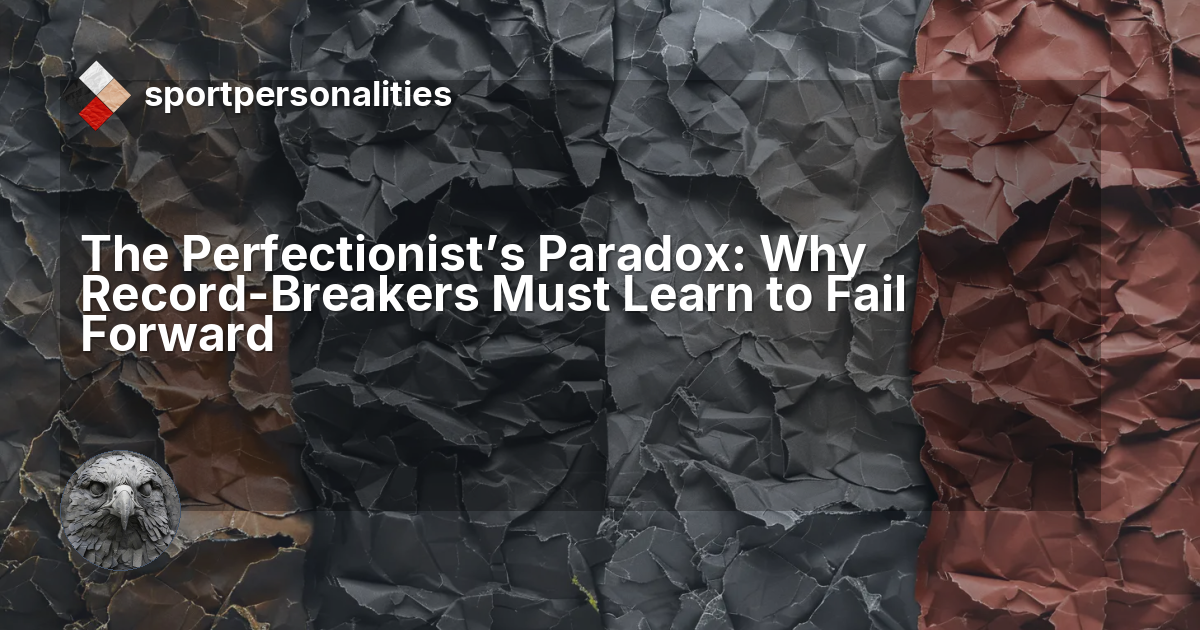Picture this scenario: An elite swimmer stands at the edge of the pool, having just touched the wall three-tenths of a second behind their personal best. The time was still faster than 95% of their competitors, but those three-tenths feel like a canyon. They've analyzed every stroke, tracked every split, and optimized their nutrition down to the gram. Yet here they are, staring at a number that represents not progress, but failure in their mind.
This moment captures the essential challenge faced by Record-Breaker athletes. These are the competitors who approach their sport like master craftsmen, blending scientific precision with relentless ambition. They dissect their performances with surgical accuracy and build their training plans like architects designing skyscrapers. But their greatest strength can become their most limiting weakness when perfectionism transforms from a driving force into a paralyzing trap.
 The Record-Breaker (ESTA)'s paradox: the same analytical precision that drives excellence can become the barrier to breakthrough performance when it prevents intelligent risk-taking.
The Record-Breaker (ESTA)'s paradox: the same analytical precision that drives excellence can become the barrier to breakthrough performance when it prevents intelligent risk-taking.
The Record-Breaker's pursuit of measurable excellence creates a unique psychological tension. Their methodical approach to improvement demands perfection, yet breakthrough performances require the willingness to fail spectacularly. Understanding how to navigate this paradox separates good athletes from legendary ones.
The Core Approach to Managing Perfectionist Tendencies While Pursuing Record-Breaking Performances
Record-Breakers typically approach failure like a detective approaches a crime scene. Every missed shot, slower split time, or technical error becomes evidence to examine, catalog, and solve. This analytical mindset serves them well in training, where each session builds systematically toward their ultimate goal.
Think of their relationship with performance like a master chef perfecting a signature dish. They measure every ingredient, track every temperature, and document every technique. The process is meticulous because the outcome matters deeply. But here lies the insight most Record-Breakers miss: even master chefs burn dishes while experimenting with new techniques.
The key shift happens when they begin treating failure not as evidence of inadequacy, but as essential data in their quest for mastery. This doesn't mean accepting mediocrity or lowering standards. Instead, it means recognizing that the path to record-breaking performances requires ventures into uncharted territory where failure is not just possible but necessary.
Harnessing Natural Strengths
The Record-Breaker's analytical precision becomes their greatest asset when redirected toward understanding failure patterns rather than avoiding them entirely. Consider a basketball player who tracks their shooting percentages from different court positions. Instead of focusing solely on made shots, they begin analyzing their misses with equal intensity. They discover that their lowest percentage comes from the left corner, but also that their biggest game-changing shots happen when they're willing to take that difficult attempt.
Their strategic thinking ability allows them to construct what experts call "controlled failure environments" in training. A track athlete might deliberately practice running negative splits that push beyond their comfort zone, knowing that some attempts will result in slower overall times. But within those failures, they gather crucial data about their body's response to different pacing strategies.
The Record-Breaker's independent preparation style gives them a unique advantage in failure recovery. Unlike athletes who rely heavily on external motivation, they can process setbacks privately and systematically. A tennis player might spend hours analyzing video of their double faults, not dwelling on the emotional impact, but mapping the technical breakdown that led to each error.
Their goal-oriented focus, when properly channeled, transforms from a source of pressure into a framework for intelligent risk-taking. They learn to set what researchers call "learning goals" alongside performance goals. A swimmer might set a time goal for a race, but also set a learning goal to test a new turn technique, knowing that the immediate performance might suffer while the long-term potential increases.
Navigating Potential Pitfalls
The most dangerous trap for Record-Breakers occurs when their need for external validation collides with the inevitable setbacks that accompany ambitious goals. Picture a cyclist who has spent months preparing for a breakthrough time trial performance. They've analyzed power data, optimized their position, and calculated exactly what splits they need to hit their target. Race day arrives, and despite perfect preparation, mechanical issues cost them crucial seconds.
In this moment, the Record-Breaker faces a choice that will define their trajectory. They can interpret this setback as evidence that their methodical approach is flawed, leading them to either abandon their systematic methods or become even more rigid in their planning. Both responses create destructive cycles.
The solution lies in expanding their definition of mastery beyond immediate results. Instead of viewing that mechanical failure as wasted preparation, they can recognize it as valuable intelligence about race-day variables they hadn't fully controlled. This shift requires them to measure progress across longer timelines and multiple dimensions.
Record-Breakers must also guard against isolation during difficult periods. Their independent nature can lead them to withdraw from coaches, teammates, or support systems precisely when external perspective becomes most valuable. The key is learning to maintain their self-directed approach while selectively incorporating outside input that enhances rather than replaces their analytical process.
Discover Your Sport Personality
This article explores one of 16 profiles. Find out which one you are and unlock a personalized blueprint for your athletic journey.
Take the Free TestActionable Steps
- Implement Failure Quotas: Set a specific number of "intelligent failures" you want to achieve each training block, treating them as essential data points rather than setbacks.
- Create Learning Metrics: Track progress indicators beyond performance outcomes, such as technical consistency under pressure or recovery time between maximum efforts.
- Schedule Strategic Risk Sessions: Dedicate specific training sessions to testing techniques or strategies that might fail, removing the pressure of perfect execution.
- Establish Perspective Partners: Identify one or two trusted individuals who can provide analytical feedback during difficult periods without undermining your independence.
- Design Comeback Protocols: Create a systematic approach for analyzing and bouncing back from significant setbacks, treating recovery as a skill to develop like any other.
Conclusion: The Path Forward
The most important insight for Record-Breakers is that true mastery requires fluency in failure. The athletes who achieve the breakthrough performances they crave are not those who avoid mistakes, but those who fail more intelligently than their competitors.
This doesn't diminish the value of their methodical preparation or analytical approach. Instead, it completes their toolkit by adding the psychological flexibility needed to venture into the uncertain territory where records are broken. The same precision they bring to analyzing successful performances can be applied to extracting maximum value from their failures.
Their path forward involves embracing a paradox: the pursuit of perfection requires the acceptance of imperfection. When Record-Breakers master this balance, they transform from athletes who achieve predictable improvements into competitors capable of unpredictable breakthroughs. The records they seek aren't just within reach – they're inevitable.
This content is for educational purposes, drawing on sport psychology research and professional experience. I hold an M.A. in Social Psychology, an ISSA Elite Trainer and Nutrition certification, and completed professional training in Sport Psychology for Athlete Development through the Barcelona Innovation Hub. I am not a licensed clinical psychologist or medical doctor. Individual results may vary. For clinical or medical concerns, please consult a licensed healthcare professional.



